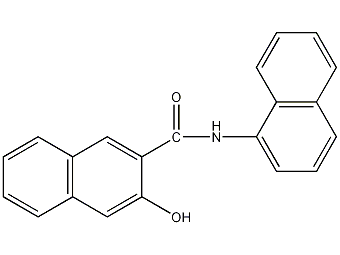
Structural formula
| Business number | 03NP |
|---|---|
| Molecular formula | C21H15NO2 |
| Molecular weight | 313.35 |
| label |
3-Hydroxy-N-naphthalen-1-ylnaphthalene-2-carboxamide, aromatic compounds |
Numbering system
CAS number:132-68-3
MDL number:None
EINECS number:205-075-5
RTECS number:QJ1897300
BRN number:None
PubChem ID:None
Physical property data
None yet
Toxicological data
Acute toxicity data:
Rat orally LD :>12mg/kg
Rat abdominal cavityLD50: 7320mg/kg
Mice orally LD :>12mg/kg
Mouse abdominal cavityLD50: 5280mg/kg
Ecological data
None yet
Molecular structure data
5. Molecular property data: 1、 Molar refractive index:98.39 2、 Molar volume(m3/mol) :234.9 3、 Isotonic specific volume(90.2K):669.5 4、 Surface tension(3.0 dyne/cm):65.9 5、 Polarizability0.5 10-24 cm3):39.00
Compute chemical data
1. Reference value for hydrophobic parameter calculation (XlogP): 5.5
2. Number of hydrogen bond donors: 2
3. Number of hydrogen bond acceptors: 2
4. Number of rotatable chemical bonds: 2
5. Number of tautomers: 9
6. Topological molecule polar surface area 49.3
7. Number of heavy atoms: 24
8. Surface charge: 0
9. Complexity: 451
10. Number of isotope atoms: 0
11. Determine the number of atomic stereocenters: 0
12. Uncertain number of atomic stereocenters: 0
13. Determine the number of chemical bond stereocenters: 0
14. Number of uncertain chemical bond stereocenters: 0
15. Number of covalent bond units: 1
Properties and stability
basic properties
This product is beige powder. Insoluble in water and sodium carbonate solution, soluble in xylene. It turns yellow in sodium hydroxide solution. Melting point is 222-223℃
Storage method
None yet
Synthesis method
Brief description of production methods
Using 2,3 acid as raw material, chlorobenzene and caustic soda are used to form a salt, dehydrated, condensed with menadimine and phosphorus trichloride, and then neutralized, distilled, filtered, washed and dried. Raw material consumption (kg/t) 2,3 acid (100%) 660 Menadimine 500 Phosphorus trichloride 250 Chlorobenzene (98%) 173 Soda ash (98%) 500
Purpose
Purpose
It is mainly used as a primer for cotton fiber dyeing and printing, as an intermediate for organic pigments, and for the manufacture of fast pigments.
areast-font-family: Arial; mso-font-kerning: 0pt”>、 Polarizability(0.5 10-24 cm3):39.00
Compute chemical data
1. Reference value for hydrophobic parameter calculation (XlogP): 5.5
2. Number of hydrogen bond donors: 2
3. Number of hydrogen bond acceptors: 2
4. Number of rotatable chemical bonds: 2
5. Number of tautomers: 9
6. Topological molecule polar surface area 49.3
7. Number of heavy atoms: 24
8. Surface charge: 0
9. Complexity: 451
10. Number of isotope atoms: 0
11. Determine the number of atomic stereocenters: 0
12. Uncertain number of atomic stereocenters: 0
13. Determine the number of chemical bond stereocenters: 0
14. Number of uncertain chemical bond stereocenters: 0
15. Number of covalent bond units: 1
Properties and stability
basic properties
This product is beige powder. Insoluble in water and sodium carbonate solution, soluble in xylene. It turns yellow in sodium hydroxide solution. Melting point is 222-223℃
Storage method
None yet
Synthesis method
Brief description of production methods
Using 2,3 acid as raw material, chlorobenzene and caustic soda are used to form a salt, dehydrated, condensed with menadimine and phosphorus trichloride, and then neutralized, distilled, filtered, washed and dried. Raw material consumption (kg/t) 2,3 acid (100%) 660 Menadimine 500 Phosphorus trichloride 250 Chlorobenzene (98%) 173 Soda ash (98%) 500
Purpose
Purpose
It is mainly used as a primer for cotton fiber dyeing and printing, as an intermediate for organic pigments, and for the manufacture of fast pigments.

 微信扫一扫打赏
微信扫一扫打赏

